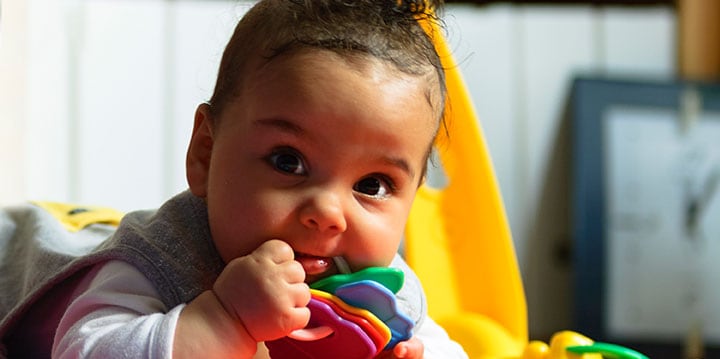Key points
- Two or more doses of rotavirus vaccine are recommended for children by doctors as the best way to protect against rotavirus.
- Two types of rotavirus vaccines are available for infants in the United States; both are safe and effective.
- Both brands of the rotavirus vaccine are given by mouth (drops).

Introduction
The best way to protect against rotavirus disease is to get the rotavirus vaccine. Children who are not vaccinated usually have more severe symptoms the first time they get rotavirus disease. Vaccinated children are less likely to get sick from rotavirus.
Available vaccines
There are two rotavirus vaccines licensed for use in infants in the United States. Both available rotavirus vaccines are given by putting drops in the infant's mouth. Your child's doctor can help you choose which rotavirus vaccine to use.
- RotaTeq® (RV5)
- Rotarix® (RV1)
Rotavirus vaccine can be safely given during the same doctor’s visit with DTaP vaccine; Hib vaccine; polio vaccine; hepatitis B vaccine; and pneumococcal conjugate vaccine.
Recommendations
Your baby should get either of the two available rotavirus vaccines.
RotaTeq® (RV5) is given as 3 doses.
- 2 months old: 1st dose
- 4 months old: 2nd dose
- 6 months old: 3rd dose
Rotarix® (RV1) given as 2 doses.
- 2 months old: 1st dose
- 4 months old: 2nd dose
Why getting vaccinated is important
Rotavirus spreads easily among infants and young children. Getting vaccinated with the rotavirus helps:
- Protect your baby from rotavirus, a potentially serious disease.
- Protect your baby from developing diarrhea, vomiting, and stomach pain caused by rotavirus.
- Keep your child from missing school or childcare and you from missing work.
Who should get vaccinated
Most infants should get rotavirus vaccine to protect against rotavirus disease.
Who shouldn't get the vaccine
Some infants should not get rotavirus vaccine, or they should wait. Check with your healthcare provider if your child has:
- A severe (life-threatening) allergic reaction to an earlier dose of rotavirus vaccine.
- A severe (life threatening) allergy to any component of rotavirus vaccine. Tell your doctor if your baby has any severe allergies that you know of, including a severe allergy to latex.
- Severe combined immunodeficiency (SCID), a condition in which a child's immune system cannot fight infections.
- A previous episode of a type of bowel blockage called intussusception.
- A weakened immune system because of:
- HIV/AIDS, or any other disease that affects the immune system
- Treatment with drugs such as steroids
- Cancer, or cancer treatment with x-rays or drugs
Infants who are moderately or severely ill should wait to get the vaccine until they recover. These include infants with moderate or severe diarrhea or vomiting. Babies who are mildly ill can get the vaccine.
The vaccine is safe and effective
Rotavirus vaccine is very safe and is effective at preventing rotavirus. Vaccines, like any medicine, can have side effects. These are usually mild and go away on their own.
Both rotavirus vaccines were tested in large clinical trials that involved thousands of infants.
- About 9 out of 10 who get the vaccine will be protected from severe rotavirus disease.
- About 7 out of 10 children will be protected from rotavirus disease of any severity.
Before a vaccine was available, many children who became ill with rotavirus were hospitalized. Now, 94% to 96% vaccinated children are protected from hospitalization.
Possible side effects
Most babies who get rotavirus vaccine have no problems. However, some babies can have side effects that are usually mild and go away on their own. These may include irritability and mild, temporary diarrhea or vomiting after a dose of rotavirus vaccine.
Intussusception
Serious side effects are possible but very rare. There is a small risk in cases of intussusception within a week after the first or second dose of rotavirus vaccine. Intussusception is a rare type of bowel blockage when the bowel folds into itself like a telescope.
Before rotavirus vaccine was used in the United States, each year about 1,900 infants developed intussusception before 1 year of age. With prompt treatment at the hospital, almost all infants who develop intussusception fully recover. Some babies might need surgery. The risk of intussusception from rotavirus vaccine is about:
- 1 case in every 20,000 U.S. infants to
- 1 case in every 100,000 U.S. infants
When to call the doctor
Finding and paying for the vaccine
Your or your child’s doctor’s office is usually the best place to receive recommended vaccines. Vaccines may also be available at pharmacies, workplaces, community health clinics, health departments, schools, or religious centers.
Vaccine costs
There are a few ways to cover the cost of vaccines:
Health insurance
Most health insurance plans cover the cost of vaccines. However, you may want to check with your insurance provider before going to a healthcare provider. Check for cost information and for a list of in-network vaccine providers.
Vaccines for Children Program
Your children may be able to get no-cost vaccines through the Vaccines for Children (VFC) Program. This program helps families of eligible children who may not be able to afford or have access to vaccines.
